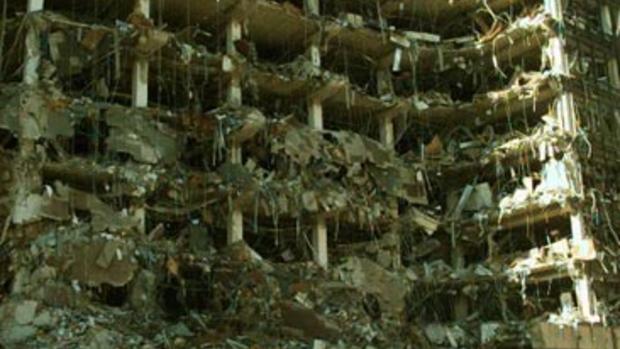Oklahoma City bombing questions rekindled with trial focusing on video
SALT LAKE CITY -- The FBI has done a thorough search of its archives and found no evidence that more Oklahoma City bombing videos exist, federal attorneys told a judge on Monday during the first day of a trial that has rekindled long-dormant questions about whether others were involved in the devastating 1995 attack.
Additional searches for videos that Salt Lake City lawyer Jesse Trentadue believes are being withheld would be burdensome and fruitless, FBI attorney Kathryn Wyer said.
The agency has already provided videos and paper documents that correspond with Trentadue's Freedom of Information Act request, she said.
"The plaintiff has refused to accept that the 30 tapes he got are the only tapes," Wyer said during opening statements in the bench trial in a Salt Lake City federal courtroom.
The trial was triggered by a Freedom of Information Act lawsuit Trentadue filed in 2008. Unsatisfied by the FBI's previous explanations, U.S. District Judge Clark Waddoups ordered the FBI to explain why it can't find videos from the bombing that are mentioned in evidence logs, citing the public importance of the tapes.
FBI attorneys intend to call bureau employees to testify the agency did a thorough search.
The trial is scheduled to last three days. There is no jury, and the judge will make a ruling.
Trentadue says the agency is refusing to release videos that show a second person was with Timothy McVeigh when he parked a truck outside the Oklahoma City federal building and detonated the bomb. The government says McVeigh was alone.
Trentadue believes the presence of a second suspect in the truck explains why his brother, Kenneth Trentadue, was flown to Oklahoma several months after the bombing, where he died in a federal holding cell. His brother bore a striking resemblance to a police sketch that officials sent out after the bombing based on witness descriptions of the enigmatic suspect "John Doe No. 2." The suspect was never identified.
Jesse Trentadue's belief that the tapes exists stems from a Secret Service document written shortly after the bombing that describes security video footage of the attack that shows suspects - in plural - exiting the truck three minutes before it went off.
A Secret Service agent testified in 2004 that the log does, in fact, exist but that the government knows of no videotape. The log that the information was pulled from contained reports that were never verified, said Stacy A. Bauerschmidt, then-assistant to the special agent in charge of the agency's intelligence division.
Several investigators and prosecutors who worked the case told The Associated Press in 2004 they had never seen video footage like that described in the Secret Service log.
On Monday, Trentadue grilled Monica Mitchell of the FBI about why her agency had not done more to search for the tape.
"Didn't it come to your mind that that tape may exist?" Trentadue asked.
Mitchell said she didn't know the authenticity of the Secret Service document. She said she has asked FBI agents in the Oklahoma City bureau about the tape several times, but none of them knew of its existence.
Trentadue asked if Mitchell had asked FBI headquarters about the tape, citing documents that show it had one tape and 300 pages of documents. She acknowledged she had not asked headquarters about those items as part of the FOIA request.
Wyer objected to questioning from Trentadue about files and areas that were not searched, but the judge allowed Trentadue to continue with the questions. He said it was relevant to explore why the FBI didn't search certain files.
Mitchell defended the FBI's methods, saying agency employees did multiple searches to adequately respond to Trentadue's request.
Trentadue's case stems from his quest to explain his brother's mysterious jail cell death 19 years ago at the U.S. Bureau of Prisons' Federal Transfer Center in Oklahoma City.
Kenneth Trentadue, 44, a convicted bank robber and construction worker, was brought there after being picked up for probation violations while coming back to the U.S. at the Mexican border, Jesse Trentadue said.
His death was officially labeled a suicide. But his body had 41 wounds and bruises that his brother believes were the result of a beating. In 2008, a federal judge awarded the family $1.1 million in damages for extreme emotional distress in the government's handling of the death. The amount was reduced to $900,000 after an appeal.
The FBI has released 30 video recordings to Trentadue from downtown Oklahoma City, but they don't show the explosion or McVeigh's arrival in a rental truck.
"(The case) bring in some new light, but it's most likely going to raise more and more questions if we get the tapes," attorney David Slane told CBS affiliate KWTV in Oklahoma City. "I think people need some closure to all this and not let it become the next John Kennedy assassination of trying to find a second shooter, Oklahomans deserve to know the answers."
